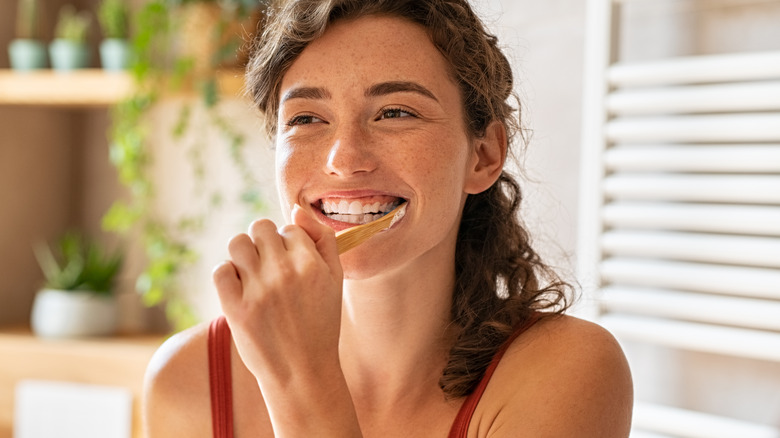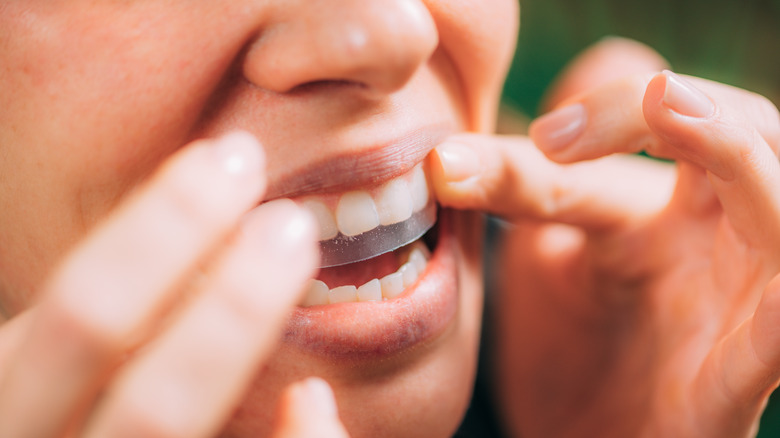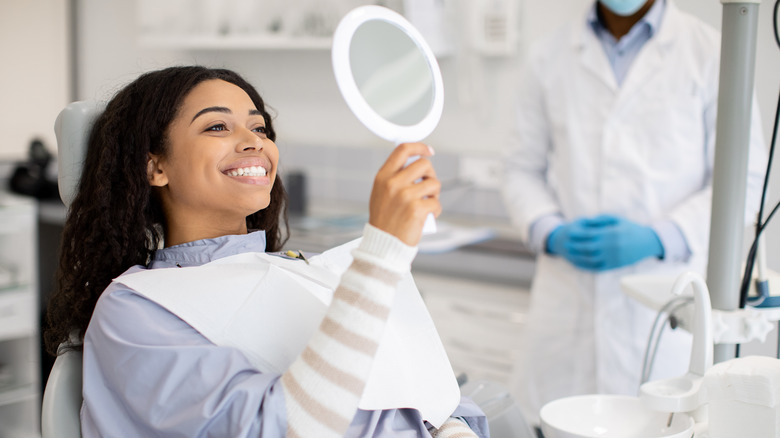47% Of People Think This Is The Best Method For Teeth Whitening - The List Survey
A good smile goes a long way. Receiving a warm and welcoming grin can turn a stranger into a friend, or mark the beginning of a beautiful relationship.
A Kelton Research study found that having straight, white teeth might be the key to happiness and success (via PR NewsWire). Research found that 29% of people notice a person's teeth and smile upon first meeting them. They also concluded that people with clean and healthy-looking teeth were 58% more likely to become successful and wealthy, 57% more likely to be considered attractive on dating sites, and 38% more often called "smart" by their peers. But not all of us feel so confident about our smiles. One study found that "3 in 5 people hate how their own smile looks," per StudyFinds.
Unfortunately, we aren't all born with perfectly straight pearly whites. Some of us endured years of braces in our youth — if we were lucky enough to afford them — only to lose our retainers and watch our teeth shift slightly in our adulthood, while coffee and wine leave long-lasting stains that cause insecurities about our teeth and smile . . . that's where teeth whitening treatments come in. There are many ways to enhance your smile available today, but which teeth whitening treatments are worth the hype? To find out which products are the best for teeth whitening, The List conducted a survey asking 587 people, "What's your go-to method of teeth whitening?"
Keep your teeth looking healthy and bright with these popular whitening solutions
According to The List's survey, the most popular teeth whitening solution with 47.87% of the vote is whitening toothpaste. This whitening solution is extremely affordable and can be found on the shelves of your local drugstore. According to WebMD, whitening toothpaste works well because it "contain[s] gentle polishing or chemical agents that provide additional stain removal effectiveness." It's important to note that whitening toothpaste takes time to see results, removing surface level stains over a long period of time, per Mayo Clinic.
The second most popular teeth whitening treatment is whitening strips. 15.16% of people say that they rely on these strips that contain peroxide or bleach for fast-acting results. Humana noted it's important to brush your teeth well before using whitening strips and follow the instructions exactly for the safety and health of your teeth.
12.95% of voters said they prefer natural teeth whitening products like activated charcoal and baking soda that provide whitening results without added chemicals, while another 9.2% of voters prefer whitening rinses. Per The List's survey, LED treatment (7.5%) and professional treatment (7.33%) are two other methods of teeth whitening that voters found effective in sustaining the appearance of healthy, white teeth.
How safe are teeth whitening treatments?
Whether your teeth are your pride and joy or you're just terrified of the dentist, it's understandable to be concerned about your teeth's safety. If you're wondering whether or not teeth whitening treatments cause damage, rest assured that specialists have confirmed that most treatments are safe, but be prepared for some side effects.
According to Healthline, one of the most prominent side effects is increased teeth sensitivity. It may feel more challenging to eat and drink after a teeth whitening treatment and may take time for the sensitivity to fade. You may also experience irritated gums that cause pain and discomfort. While these side effects are not permanent, it's important to remember that teeth whitening treatments are not permanent solutions to stains and discoloration either.
NYU College of Dentistry Professor Dr. Timothy Bromage told The New York Times that misusing extremely harsh chemicals and abrasive usage can actually be "counterproductive to your whitening efforts." If you overuse whitening products or combine them with abrasive usage, you can damage the enamel in your teeth which will actually make your teeth look more yellow over time. According to the National Institute on Aging, experts report that the best thing you can possibly do for your teeth is brush and floss regularly with ADA-approved toothpaste, and make frequent trips to the dentist.


